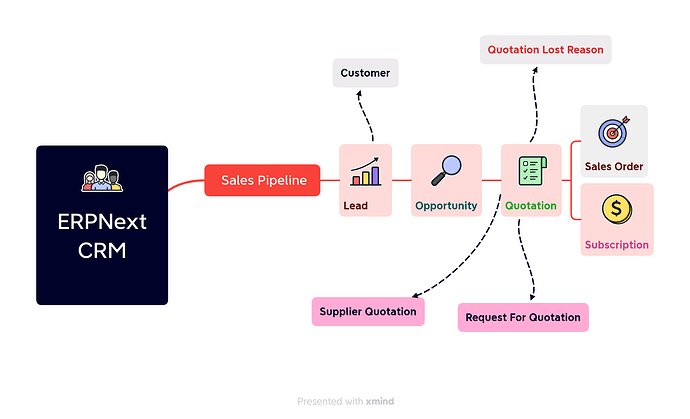Workflow
Reference Documentation
Explanation
ERPNext CRM (Customer Relationship Management) is a module that helps businesses effectively manage and track interactions with their customers throughout the entire customer lifecycle. It provides a centralized platform to store customer data, track communication, manage leads and opportunities, and streamline sales processes.
CRM Workflow in ERPNext refers to the defined sequence of steps and actions that guide the process of managing customer interactions. It allows businesses to automate and standardize their sales and marketing processes, ensuring efficient lead management and effective customer engagement.
Here’s a detailed description of ERPNext CRM and its workflow:
1. Contact Management: ERPNext CRM allows you to store and manage detailed information about your customers, including their contact details, communication history, activities, and notes. You can easily access and update customer data from a centralized database.
2. Lead Management: The CRM module enables you to capture and manage leads effectively. You can create leads manually or automatically convert them from website inquiries, emails, or other sources. You can assign leads to sales representatives, track their progress, and prioritize them based on their potential.
3. Opportunity Tracking: ERPNext CRM helps you track and manage opportunities, which represent potential deals or sales. You can create opportunities from leads or directly enter them into the system. You can assign opportunities to specific sales representatives, track the sales pipeline, and monitor the progress of each opportunity.
4. Sales Pipeline Management: The CRM workflow in ERPNext allows you to define a structured sales pipeline with different stages, such as prospecting, qualification, proposal, negotiation, and closure. You can customize the pipeline stages to align with your business processes. As leads and opportunities progress through the pipeline, you can update their status and track key metrics like conversion rates and win-loss ratios.
5. Communication Tracking: ERPNext CRM automatically tracks all communication activities related to customers, including emails, calls, meetings, and notes. You can log interactions with customers, attach relevant documents, and maintain a comprehensive history of all communication for reference.
6. Task Management: The CRM module includes task management capabilities, enabling you to assign tasks to team members, set deadlines, and track task completion. This helps in coordinating activities and ensuring timely follow-ups with customers.
7. Reporting and Analytics: ERPNext CRM provides various reports and analytics to gain insights into your sales performance, lead conversion rates, customer interactions, and more. You can generate custom reports, visualize data with charts and graphs, and make data-driven decisions to optimize your sales processes.
In summary, ERPNext CRM empowers businesses to streamline their customer management processes, track sales activities, and enhance customer engagement. The CRM workflow helps automate lead management, opportunity tracking, and sales pipeline management, enabling efficient sales operations and effective customer relationship management.
Contact
Github: Antony-M1 · GitHub
Linkedin: Antony
